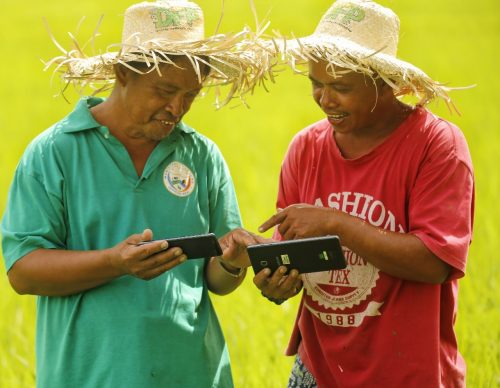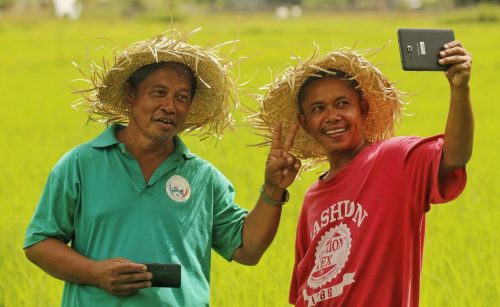Born to a farming family, Edralyn Ferre has been tilling the land in Alfonso, Cavite, for over 50 years, guided only by traditional knowledge handed down by his elders. Through the years, however, he sought to learn more and go beyond simply increasing and improving his yield.
Once, he attended a training session at the Department of Agriculture and learned how to ferment local fruits and make wine.
“I was able to tap a new source of income,” Ferre, 62, says in Filipino. He now realizes that the Philippine fruit wine industry has a lot of potential, even for international distribution. Not many farmers are aware of this, he adds.
“If only they know how relatively easy fruit wine-making is, and how it can extend the life of their produce, they can definitely avoid losses,” he explains.
He decided to share his newfound knowledge with the aid of technology: he made a video about fruit wine-making and posted it online.
Video-making is one of skills he learned through the Digital Farmers Program (DFP) spearheaded by the Department of Agriculture – Agricultural Training Institute (DA-ATI), Probe Media Foundation, and PLDT-subsidiary Smart Communications, Inc.
The program links technology-savvy youths with small-holder farmers so that the latter could tap the digital space, and consequently, establish a channel for exchanging ideas — from using modern agriculturaltechnologies, to discovering time-tested farming traditions.
DFP aims to empower small-scale farmers through a ladderized education approach. The first phase focuses on the use of the smartphone and its features, Android capabilities, social media platforms, search engines, messaging channels, and internet safety. Farmers are also trained in “phonetography,” or basic photography and videography. Complemented with production, interviewing, writing and editing workshops, they can develop local agri-related content.
Advance phases cover mobile agriculture and financial services—third-party farming apps, mobile e-money, micro credit, and more. The final phase involves digital entrepreneurship, Internet of Things (IoT), content development modules, and advance Internet safety, such as data privacy.

Ferre learned video-making with the guidance of youth volunteer Rafael Nuestro. He also familiarized himself with social media.
“Farmers now get in touch more easily even if we are in different parts of the country,” he says. “We just go online, and we learn from each other and from resources on the internet.”
“Malaki ang maitutulong ng DFP sa aming mga magsasaka, dahil ang teknolohiya ay makakapag-upgrade ng aming kaalaman sa agrikultura, kahit akala namin’y marami na kaming alam (DFP can be of great help to us farmers, because we can upgrade our knowledge of agriculture through technology),” Ferre says.
Each DFP 101 session is composed of up to 15 farmers, who are each partnered with a youth representative from the Department of Agriculture’s 4H Club, or its equivalent youth organization in the community. During the training session, youth representatives guide their partner farmers through hands-on exercises and ensures that the video activity will be accomplished.
As of December 2019, DFP has conducted phase 1 training sessions in 14 areas nationwide: Alfonso, Cavite; Lobo, Batangas; Tanay, Rizal; Magdalena, Laguna; El Salvador, Misamis Oriental; Malaybalay City, Bukidnon; Dauis, Bohol; Mangatarem, Pangasinan;Cauayan, Isabela; San Mateo, Isabela; Bingawan, Iloilo; Pavia, Iloilo; Agusan del Sur; and Agusan del Norte.
The success of DFP’s pilot run has led to another initiative in partnership with one of its training sites in Region IV-A (CALABARZON). In collaboration with the Municipal Agriculture Office of Magdalena, Laguna, Smart spearheaded a company-wide campaign to purchase white and brown rice from local farmers for PLDT-Smart employees. In the span of two weeks, around 2,000 kilos of rice were purchased from these farmers, generating close to P100,000.
With the interest shown by the employees in what is now dubbed as the #BuyLocal Initiative, the program is now implemented on a monthly basis. This is intended not only to boost support for the farmers but also inspire other institutions to join the cause to support Philippine agriculture.
“We are optimistic about DFP, as it combines technology, through Smart, with the expertise of DA-ATI in terms of the various agricultural technologies,” said DA-ATI Division Chief Antoineta Arceo.
DFP is part of the Smart Communities advocacy, which taps Technology for Development (Tech4D) to narrow down the digital divide. The program is also aligned with the commitment of Smart’s parent company, PLDT, to support the 17 Sustainable Goals of the United Nations.
“The project specifically gives emphasis to the UN’s goals of No Poverty and Industry, Innovation and Infrastructure,” says Darwin F. Flores, VP for Community Partnerships at Smart. “There is already an economic divide, so it is up to companies such as Smart to eliminate a digital divide through initiatives such as DFP.”

